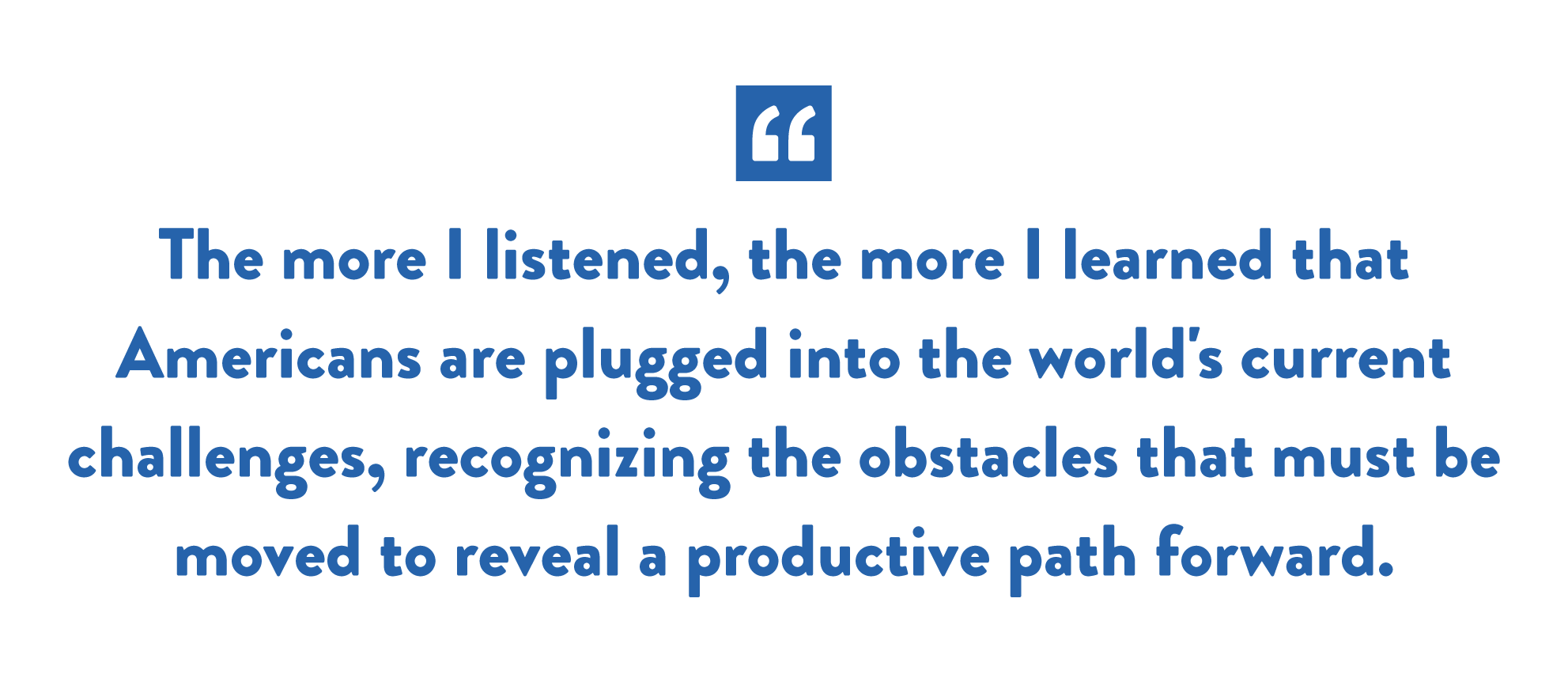Americans have always played a crucial role in the UN. In 1945, ahead of the San Francisco Conference where the UN Charter was signed, the American Association for the United Nations (which later became our organization, the United Nations Association of the USA or UNA-USA) was among 40 groups advocating for its formation. Then, and now, we have always believed that nations working together through the UN are the best hope for peace and progress for all. And in its 75th anniversary year, we are still lifting up our voices to shape the UN.
In fact, almost 2,000 Americans, from all 50 U.S. states plus Washington, D.C., and Puerto Rico, recently took part in more than 80 virtual consultation sessions that we facilitated as part of UN75, the UN’s yearlong global conversation to gather opinions from as many diverse groups of people across the world as possible on the current and future state of the world.
Our membership is already incredibly diverse, and we were delighted that many nonmembers also took part. People from the business sector, faith-based communities, civil society, and local government came together to answer the UN’s three big UN75 questions:
- What kind of future do we want to create?
- Are we on track to secure a better world?
- What action is needed to help us build a brighter future?
What we found was both sobering and inspiring.
Most Americans expect the world to get worse if current trends continue.
More than three-quarters (77%) of our participants told us that, based on current trends, they expect the world to get worse in the future. Among the reasons they cited were human rights violations, homelessness, barriers to health care access, climate change, gender inequity, and systemic racism.
We used a mix of polling questions and open-ended discussions to capture a real, textured snapshot of what Americans are feeling. Participants were asked to express views on how the world would look if current trends continued — and whether actions today would make positive or negative impacts on the world in the next 25 years. The more I listened, the more I learned that Americans are plugged into the world’s current challenges, recognizing the obstacles that must be moved to reveal a productive path forward. And while feelings definitely skewed negative, there was an acknowledgment that each of us plays an integral role in shaping our world’s future.

COVID-19 highlights concerns about education, inequality, justice, climate.
Our 1,850 participants raised a huge range of issues of concern, which we categorized according to the Sustainable Development Goals (SDGs), the framework all countries agreed upon to help us arrive at a better world for all by 2030. Almost half of consultations reported SDG 4: Quality Education, SDG 10: Reduced Inequality, SDG 13: Climate Action, and SDG 16: Peace, Justice and Strong Institutions as critical for the future, and critical for improving human health and well-being on a global scale.

COVID-19 came up a lot as an underlying factor in many of the issues people raised. For example, the pandemic has had an enormous impact on education with millions of students out of school, and it has exacerbated and highlighted existing inequalities – with women more affected by the socioeconomic impacts, and people of color more likely to die because of unequal access to health care — while destruction of the natural world increases the likelihood of humans coming into contact with dangerous pathogens.
With our consultations taking place at this unprecedented time in human history, and with the pandemic pushing us even further off track to meet the SDGs, participants believed that focusing on these four goals would lay a foundation to make progress on the other 13 goals, thus helping the world to better recover from COVID-19.
A brighter future requires a group effort.
Across all the consultations we hosted, Americans were not only willing to identify things that needed improvement, but they also were vocal when it came to how we take action. They believe that the only way to achieve the SDGs and guide our planet in a positive direction is through increased coordination between governments, organizations, and individuals.
Among ideas for how to improve the world’s prospects, participants identified actions for specific stakeholders. The UN, they said, should use advocacy, education, community engagement, international policy coordination, and accountability tracking as tools to drive global progress. Governments, they suggested, should incorporate the SDGs and sustainability into policy development, and they should engage more with the UN. Organizations, including businesses, should engage in more public-private partnerships, invest in sustainable business solutions, and implement more equitable and sustainable internal policies and processes. And participants agreed that everyone everywhere has a part to play, including individuals, who should educate themselves more on issues, make more sustainable consumption decisions, and engage in more civic and community activities and activism. For me, the UN75 consultations represent how citizens and governments should interact on a daily basis.
There was even advice for UNA-USA, encouraging us to do more to engage local communities and people in the activities and work of the UN. Not only will these great thoughts help guide us, but the challenges and obstacles our participants identified will also inform our work and that of other organizations on how we can shape our programming and advocacy initiatives to ensure that Americans ultimately have a more positive view of the world in 25 years.
Opinions expressed through the UN75 project will be delivered to the UN during its annual General Assembly meeting in September, and they will help guide discussions and deliberations of its member states. Once again, Americans are helping to shape the UN.
Want to get involved?
Become a member of UNA-USA. With more than 20,000 members and 200 chapters across the U.S., we are always in search of new voices to help advocate for a strong U.S.-UN relationship. Learn more and join the movement.
Ask your members of Congress to commemorate the UN’s 75th anniversary by supporting strong U.S. leadership on the world stage. As a founding member of the UN, the U.S. plays a vital role in promoting peace and upholding human rights around the world. However, recent news regarding the UN funding crisis has alarmed many Americans across the country about the future for multilateral partnerships. Send a message to your representative and senators.
Check out all of the findings from our UN75 consultations. We have so many valuable insights gleaned from our conversations with Americans. Read the full report for in-depth analyses in key issue areas. Explore the complete report.



 View All Blog Posts
View All Blog Posts



